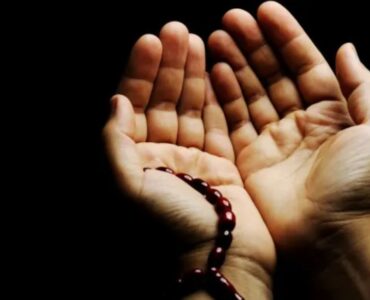By A. Zeynep Donmez – Ozlem Ata Translated from Turkish by Yilmaz Kaso
A chapter from the book ‘Friday of the Youth” Sydney, AUSTRALIA
VIRTUOUSNESS
بِسْمِ اللَّهِ ٱلرَّحْمـٰنِ ٱلرَّحِيمِ
لَّيْسَ ٱلْبِرَّ أَن تُوَلُّواْ وُجُوهَكُمْ قِبَلَ ٱلْمَشْرِقِ وَٱلْمَغْرِبِ وَلَـٰكِنَّ ٱلْبِرَّ مَنْ آمَنَ بِٱللَّهِ وَٱلْيَوْمِ ٱلآخِرِ وَٱلْمَلاۤئِكَةِ وَٱلْكِتَابِ وَٱلنَّبِيِّينَ وَآتَى ٱلْمَالَ عَلَىٰ حُبِّهِ ذَوِى ٱلْقُرْبَىٰ وَٱلْيَتَامَىٰ وَٱلْمَسَاكِينَ وَٱبْنَ ٱلسَّبِيلِ وَٱلسَّآئِلِينَ وَفِى ٱلرِّقَابِ وَأَقَامَ ٱلصَّلاةَ وَآتَى ٱلزَّكَاةَ وَٱلْمُوفُونَ بِعَهْدِهِمْ إِذَا عَاهَدُواْ وَٱلصَّابِرِينَ فِى ٱلْبَأْسَآءِ وٱلضَّرَّاءِ وَحِينَ ٱلْبَأْسِ أُولَـٰئِكَ ٱلَّذِينَ صَدَقُوآ وَأُولَـٰئِكَ هُمُ ٱلْمُتَّقُونَ
“Virtuousness is not turning your faces to the direction of east or west. Virtuousness is (the manner of) the person who trusts in God, the Last Day, the angels, the Books, and the prophets (the nabi). The virtuous -despite their love for their properties- give them away to relatives, orphans, the desperate, the travelers, to those who ask (for charity), and for (freeing) the people in subjugation. These people observe the prayer duly and regularly and give the zakat. They also fulfill their commitments whenever they make one. They are those who stand their ground against pressures, adversities, and in times of sudden distress. Those are the ones who are truthful, and those are the ones who refrain from doing wrong.” (Al-Baqarah 2:177)
الْبِرُّ حُسْنُ الْخُلُقِ وَالإِثْمُ مَا حَاكَ فِي نَفْسِكَ وَكَرِهْتَ أَنْ يَطَّلِعَ عَلَيْهِ النَّاسُ
“Virtuousness is good morals. And sin is what is on your conscience, and you would hate people to discover about.” (Jami at-Tirmidhi, Zuhd 52; Ahmad b. Hanbal, 4/182)
Dear youth,
If we ask you which behaviors are virtuous, you will all have an answer because virtuousness is an extensive notion that includes all types of right conduct. Everyone knows what is right and wrong because of the inherent information in their nature, granted by Allah. This “inherent natural creation” is called “fitrah.” Allah the Almighty blows a soul into every human being during our creation. This soul loads certain information on every person, like installing the basic operating system on a computer. Because of this knowledge, they know how to listen, make inferences based on what they experience and see, and understand events and the relationships between events. Again, because of their fitrah, they know that their Lord is one, and they know what is good and what is evil so that they can decide by using their intellect according to these criteria. In short, the good and the bad are known in the same way worldwide because of the people’s fitrah. If we still want to make a general definition of virtuousness, we can find it in the hadith we read at the beginning of our sermon. Rasullullah (SAW) said that “Virtuousness is good morals. And sin is what is on your conscience, and you would hate people to discover about.” This sentence describes virtuous and evil so clearly that everyone can easily understand. If you are unsure whether something is virtuous or not, you can decide per this hadith.
Dear youth,
The Qur’an gives information about good morals in many verses. The behaviors we must avoid and the evil are also clearly expressed in the Qur’an. Verse 177 of Surah Al-Baqarah, which we read at the beginning of our speech, is one of the verses defining virtuousness. “Virtuousness is not turning your faces to the direction of east or west. Virtuousness is (the manner of) the person who trusts in God, the Last Day, the angels, the Books, and the prophets (the nabi).”
Here, Allah (CC) stated that virtuousness is not in our behavior only, but real virtuousness will begin by accepting faith principles. Other actions expected from the person who believes in these principles are also mentioned in the continuation of the verse: “The virtuous, despite their love for their properties, give them away to relatives, the orphans, the desperate, the travelers, to those who ask (for charity), and for (freeing) the people in subjugation.”
It is clear who the other groups of people in this verse are, but let’s explain the expression “people in subjugation” here. These may be prisoners who have fallen into the hands of enemies at war, as well as the people who cannot use their free will for some reason, that is, cannot choose freely because of an obligation or dependency. Helping them is also considered a virtue.
Dear youth,
The verse further lists the characteristics of those who are virtuous: “They observe the prayer duly and regularly and give the zakat. They also fulfill their commitments whenever they make one.”
In the verse, Allah does not only say “they pray,” but He says, “they observe the prayer duly and regularly.” So, a true Muslim, a person who fully trusts Allah, never neglects prayers and prays appropriately and continuously. It is also significant that this is described as a part of virtuousness. Here I would like you to think a little bit about your own prayer and make self-criticism because it is yourself who knows you best. You may not have your own earnings yet, but if you want to be among the virtuous ones when you are in a position to earn income, you should give your charity (zakat) as much as necessary. The next part of the verse emphasizes that fulfilling the requirements of a commitment you made is also part of virtuousness.
Dear youth,
In the continuation of the verse, it is mentioned that “The virtuous are those who stand their ground against pressures, adversities, and in times of sudden distress.” That means people may be exposed to various hardships and distress while trying to commit the virtuous acts described in the verse. They may even encounter unexpected negativities at unexpected times. It is the distinctive feature of the virtuous that they stand their ground even in such times. That is, they do not compromise with these virtues.
After all of this is explained, the verse ends by saying, “Those are the ones who are truthful, and those are the ones who refrain from doing wrong.”
If we want to be among the virtuous ones, we must act in accordance with this verse. Thus, we hope that we will be among the saved ones.








Add comment